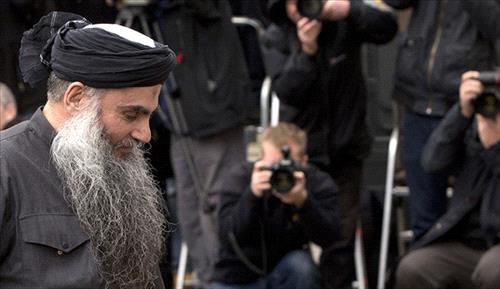Ammon News - AMMONNEWS - Jordanian cleric of Palestinian origin also known as "Abu Qatada," lashed out at the Islamic State of Iraq and al-Sham (ISIS) for imposing a tax on Christians in Syria, saying that it goes against Islamic teachings.
On Feb. 26, ISIS announced it was imposing a series of rules on Christians in the Syrian city of Raqqa, which is controlled by the group. These rules include paying a jizya — a tax historically paid by non-Muslim citizens of an Islamic state, under Islamic law — and requirements that they perform religious ceremonies in private.
Abu Qatada went before the Jordanian State Security Court on Thursday, as part of his trial on terrorism charges. Speaking to Al-Hayat just before the session began, he said, "Imposing a jizya on the Christian residents of Syria is not religiously permissible, because it should be a contract between two parties, and one party is absent."
He added, "The mujahedeen in Syria do not yet have [sufficient] power, and they cannot protect the lives and properties of Christians given the current conditions. It is religiously unacceptable for us to take their money and not provide them a service."
ISIS announced it had reached an "agreement" including 12 terms, which aimed to ensure the "protection" of Christians. The group warned that anyone who does not respect the agreement will be treated as an enemy. The agreement, which was published on Salafist websites close to militant groups in Syria and carry the ISIS seal, stipulated that Christians would pay a jizya, which was imposed on non-Muslims in the days of the Prophet Muhammad and in the era of the caliphs.
Abu Qatada continued his verbal attack against ISIS, indirectly accusing the group of killing Abu Khaled al-Souri. The latter was a leader in the Islamic Front, one of the formations fighting against ISIS in Syria. "I am very sad about the killing of the Mujahid Abu Khaled. … I never expected that he would die at the hands of these criminals who adopt a deviant ideology," Abu Qatada said.
He said, "[Souri's] killing resembled the murder of the Caliph Ali, may God bless him, who was killed by the criminal [Abdel Rahman] Ibn Muljam," adding, "[the death] of Abu Khaled was a great loss for us. I knew him well and met with him in London. His loss is like the loss of the Mujahid Sheikh Osama bin Laden."
Souri was killed on Feb. 23 by a car bomb in the city of Aleppo. The attack was carried out by a suicide bomber from ISIS, according to the Syrian Observatory for Human Rights.
Souri was one of the most important jihadist leaders in Syria, and al-Qaeda identified him as "[al-Qaeda leader] Ayman al-Zawahri's deputy [in Syria], and a companion of Sheikh Osama bin Laden." Jabhat al-Nusra leader Abu Mohammad Golani lamented the death of Souri, saying, "He was a friend of Sheikh Osama, Dr. Ayman and other distinguished jihad leaders and Islamic scholars." He also accused ISIS leader Abu Bakr al-Baghdadi of killing Souri.
In response to a question posed by Al-Hayat regarding the deadline Golani had given to his sworn enemy, Baghdadi, Abu Qatada said, "I support everything Golani said. Targeting mujahedeen in this disgraceful manner is unacceptable. It is their right to defend themselves."
The leader of Jabhat al-Nusra has given ISIS a five-day deadline to submit to arbitration to end infighting among Islamists. If ISIS refuses, he vowed to fight them in Syria and Iraq. Abu Qatada said, "Our primary goal is fighting the criminal regime in Damascus, but the filth along the way must be eliminated. Those who adopt deviant ideology should stop [their actions]," in an explicit reference to ISIS. He added, "I can confirm today that the so-called 'Islamic State of [Iraq and] al-Sham' is not [a unified group]. Those close to ISIS confirmed to me that this organization is composed of groups without leadership or a unifying system. The [group's] media official and spokesman has been injured."
Abu Qatada continued, "This jihad will reach its final goal in Syria, but we are awaiting the blessing of jihad from other countries."
On another matter, Abu Qatada told a group of journalists that he was refraining from eating prison food, in protest against his living conditions and that some of his relatives had been prevented from visiting him.
He said, "There are nine jihadists in my prison block who have gone on complete hunger strike, while two others are abstaining from eating prison food. The latter did not fully participate in the hunger strike because of their deteriorating health, so they decided to buy food at their own expense."
Abu Qatada said that Salafist detainees in Jordan were not allowed to see their relatives, aside from immediate family members, and said that one of the prison officials is not listening to them. During his court session, which was attended by representatives from Western embassies, Human Rights Watch and a number of activists, Abu Qatada complained about the length of his court sessions. The judge postponed the trial until March 15. Abu Qatada is one of the most prominent al-Qaeda ideologues. He fled to Britain in 1993, and was deported to Jordan last summer following an agreement between London and Amman that no evidence extracted under torture would be used against him.
*Al-monitor








 comment replay
comment replay 